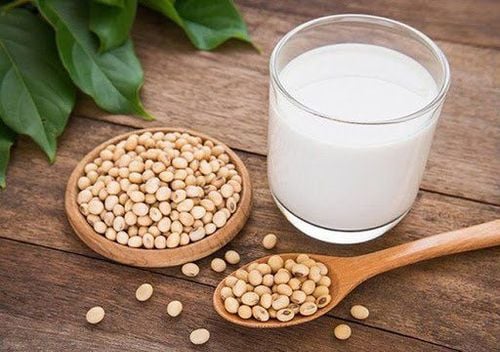This is an automatically translated article.
What you eat affects your body. While not the only solution, maintaining a balanced diet will not only help prevent breast cancer but also promote overall health. Here are foods that can help prevent breast cancer.1. Foods that prevent breast cancer There is no one specific food that can cause or prevent breast cancer. However, diet is a factor that can help you reduce your overall risk of breast cancer.
For example, a diet rich in antioxidants may be beneficial for breast cancer prevention because antioxidants help protect cells from free radicals. Free radicals are molecules released by toxins, such as cigarette smoke.
They are not only linked to cancer, but can also contribute to premature aging and heart disease. Making proactive dietary choices, in addition to potentially reducing breast cancer risk, improves overall health: Helps maintain energy, strengthens the immune system, and provides nutrients essential nutrients for the body. Food is preventive only, so you shouldn't rely on it as your only preventive action.
2. Drinks 2.1 Green Tea Green tea is associated with a variety of benefits, from weight loss to blood pressure control. It contains many polyphenols and catechins. These antioxidants can help protect cells from DNA damage caused by free radicals. While more research is still needed to prove its effectiveness, there's absolutely no harm in adding a cup to your daily routine.
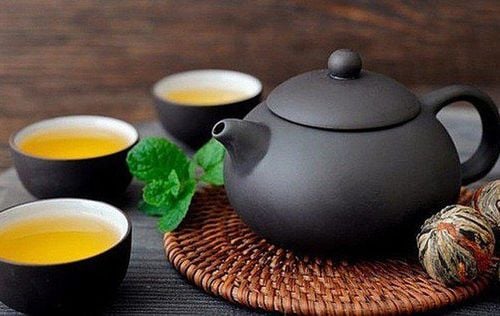
Trà xanh là một trong những đồ uống chống ung thư hiệu quả hiện nay
2.2 Pomegranate Juice This juice contains polyphenols. A 2009 study found that pomegranate juice has the potential to be a preventive tool for several cancers, including breast cancer. The researchers also suggest pomegranate extract may provide similar benefits in smaller doses than the juice.
If you have diabetes, talk to your doctor before adding pomegranate juice to your diet, as juices are often high in sugar and can affect your blood glucose levels.
3. Fruits 3.1 Berries Berries such as blueberries, strawberries, and blackberries all contain high amounts of polyphenols, which may have anti-cancer properties. In addition, they are high in antioxidants, such as vitamin C.
3.2 Plums and peaches According to a 2009 animal study, polyphenols found in plums and peaches may help prevent breast cancer cells from forming and prevent cancer cell multiplication.
Evidence shows that polyphenols help kill cancer cells while not affecting healthy cells. Eating fruit is healthy, but more research is needed to determine how much you should eat to benefit from its cancer-fighting properties.
4. Vegetables 4.1 Vegetables This vegetable is usually rich in antioxidant vitamins, such as C, E and K, and is high in fiber. Cruciferous vegetables contain glucosinolates, which are chemicals with anti-cancer properties. Common cruciferous vegetables include: broccoli, cauliflower, cabbage, and kale.
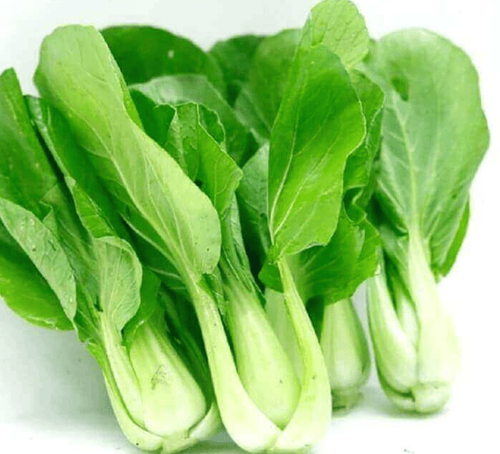
Các loại rau họ cải chứa lượng lớn chất chống oxy hóa và vitamin cần thiết
4.2 Dark Green Vegetables The darker the green vegetables, the more nutrient dense they are. Green vegetables are often high in antioxidants and fiber, which are powerful cancer-fighting tools. Popular options include: spinach, kale and turnip greens
5. Substances that may reduce breast cancer risk 5.1 Carotenoids Carotenoids are found in many red, orange, and green fruits and vegetables dark and golden. These foods are often high in vitamin A, lutein, beta carotene, and lycopene, all of which are effective against free radicals. You can find Carotenoids in foods like: carrots, tomatoes, kale, apricots and sweet potatoes
5.2 Apigenin Apigenin is a flavonoid found in a number of fruits, vegetables, and herbs. Since apigenin is an antioxidant, these foods may have anti-inflammatory properties. According to a 2010 study, apigenin can inhibit growth in breast cancer cells.
Apigenin is found in foods such as: parsley, celery, chamomile, mint, spinach, licorice. It is also found in some herbs such as: oregano, basil, thyme, rosemary, coriander
5.3 Omega-3 Omega-3 fatty acids are found in abundance in cold-weather fish. It is an essential nutrient that supports the immune system. A 2015 study evaluated the potential impact of omega-3s on women who were obese and had dense breast tissue. Women with dense breast tissue are six times more likely to develop breast cancer than women with less breast tissue. In this study, breast tissue density decreased in relation to the amount of omega-3 fatty acids used. This is thought to reduce the risk of breast cancer.
High levels of omega-3 can be found in fish such as salmon, sardines, herring, oily fish. Lesser quantities can be found in walnuts, flaxseeds and nut oils.
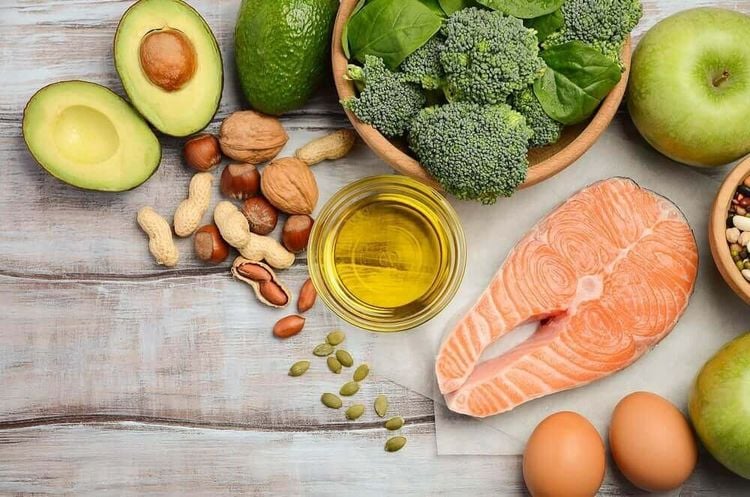
Omega-3 được tìm thấy rất nhiều trong cá hồi và một số loại cá khác
5.4 Lignans and saponins Lignans and saponins are polyphenols with anti-cancer properties. They are commonly found in legumes, such as: lentils, peas, kidney beans. In addition, beans also contain antioxidants, protein, folate and fiber.
5.5 Grains Whole grains also tend to be high in cancer-fighting polyphenols. They also often contain other important nutrients, such as fiber, magnesium, and protein. Popular whole grain options include: brown rice, oatmeal, farro corn, barley.
6. Spices and Supplements 6.1 Capsaicin Both dried and fresh chili peppers contain capsaicin. The hotter the pepper, the more capsaicin it has. Capsaicin is primarily known as an effective topical and topical treatment for pain. A small 2016 study found that capsaicin might stop the growth and spread of malignant cells in some people with breast cancer.
Research is done in a laboratory on tissue samples taken from women with different types of breast cancer. Capsaicin can be given as a supplement, but eating too much can cause irritation to the gastrointestinal tract. Currently, there are no specific dosage recommendations for the use of capsaicin.
6.2 Garlic Garlic is known for its distinctive taste and aroma. A 2017 study analyzed the effects of garlic and other allium vegetables on breast cancer cells. They found a positive effect on both estrogen-dependent and estrogen-independent breast cancers. Although promising, more research is needed on this to determine final results and dosing recommendations.
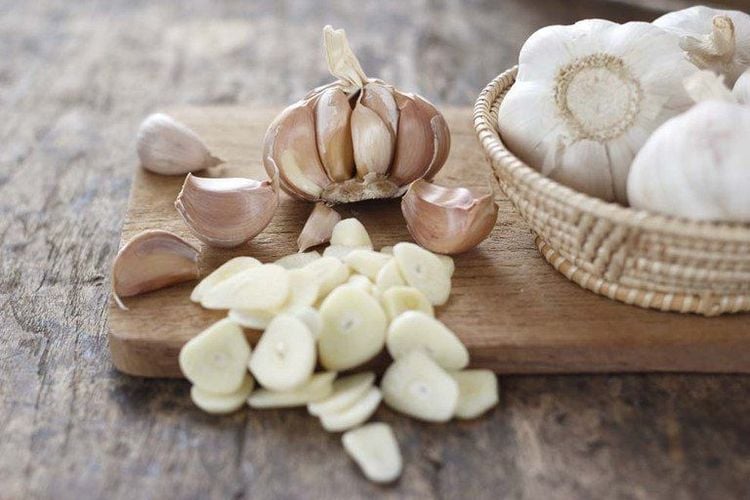
Tỏi có mùi thơm và hương vị đặc biệt khi kết hợp với các loại rau sẽ phát huy tác dụng chống ung thư
6.3 Turmeric A spice commonly found in Indian cuisine, turmeric contains curcumin, a substance with potent anti-inflammatory and antioxidant properties. Some studies suggest that curcumin may help reduce the toxic effects of certain breast cancer cells and potentially inhibit cancer cell growth. Curcumin is unstable in water and may be poorly absorbed.
Although curcumin is not stable, many animal and human studies to date show benefits from the use of curcumin. Currently, the recommended daily dosage ranges from 200 to 500 milligrams of curcumin per day.
7.Isoflavones should be avoided Some foods, such as soy products, contain natural chemicals called isoflavones. These are substances that are structurally similar to the hormone estrogen.
Isoflavone-rich foods are also known as phytoestrogen-rich foods. Isoflavones bind to the same site as estrogen, but produce different results in the body.
For example, estrogen can increase inflammation in certain areas of the body but isoflavones cannot. The use of isoflavones is controversial. One person is concerned that soy and other isoflavones might increase the risk of breast cancer. In fact, several other studies suggest that isoflavones offer positive health benefits, including anti-cancer properties. When consuming soy, it is best to choose whole soy foods, including tofu and soy milk.
8. Foods to limit or avoid No specific foods have been shown to cause or worsen breast cancer. However, there is some evidence linking alcohol use to increased rates of breast cancer in some women. Drinking alcohol can increase the risk of breast cancer. This may be because alcohol can increase levels of estrogen and other hormones associated with this form of breast cancer.
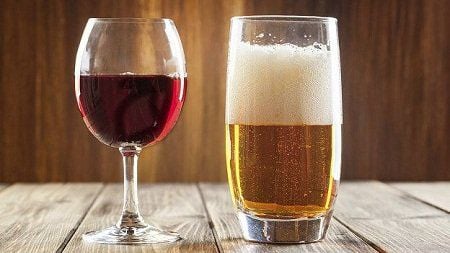
Phụ nữ cần tránh xa các thức uống có cồn vì chúng có thể làm tăng nguy cơ mắc ung thư vú
It is currently estimated that women who drink three alcoholic beverages per week are 15% more likely to develop breast cancer than women who do not drink alcohol. This risk can increase by 10 percent for each additional weekly drink.
9. Diet There aren't any anti-cancer diets for you to follow. The best thing you can do is eat a balanced diet rich in fruits and vegetables, reduce or eliminate processed foods, reduce added sugars, and reduce saturated and trans fats.
What you eat affects your health. Diet and nutrition are an important aspect in preventing and fighting breast cancer. But more research is still needed to determine the extent of the effect. Remember that fruits and vegetables retain their nutritional value when they are fresh. So eat them while they're fresh for maximum value.
In addition, screening prevents and reduces environmental toxins that can contribute to cell mutations. Schedule annual mammograms and ultrasounds to detect the earliest signs of breast cancer.
Customers can directly go to Vinmec Health system nationwide to visit or contact the hotline here for support.
Please dial HOTLINE for more information or register for an appointment HERE. Download MyVinmec app to make appointments faster and to manage your bookings easily.
Article referenced source: healthline.com








